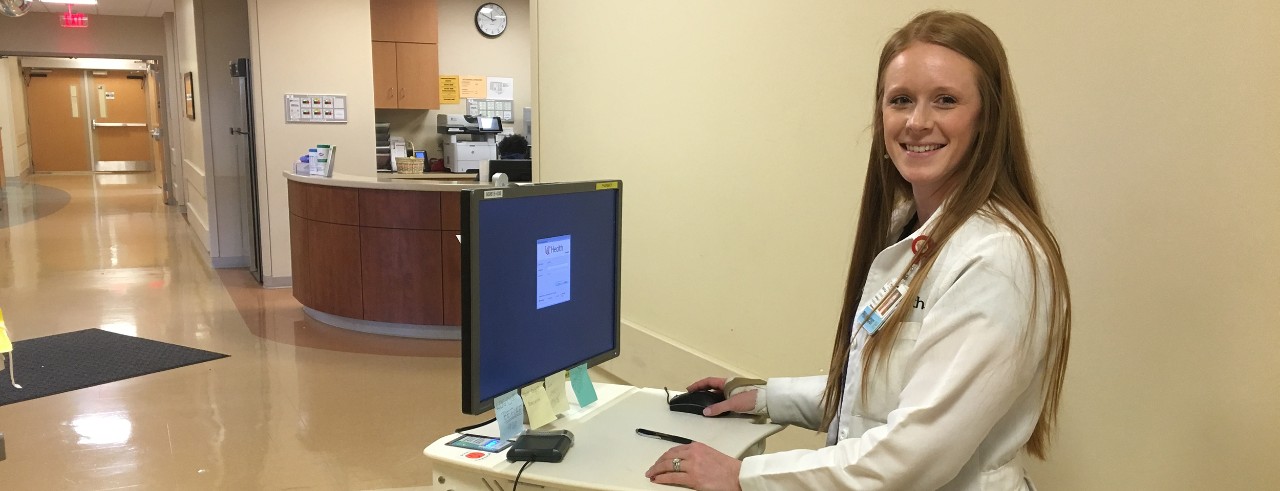
Focus on practice partner Kayla Leidenbor, PharmD
Pharmacist Kayla Leidenbor learned from the best, and now she's one of them!
Kayla Leidenbor, PharmD is a 2013 alumna of the James L. Winkle College of Pharmacy and works as a Transitions of Care Pharmacist at UC Health’s West Chester Hospital. Her practice allows her to focus on optimizing medication therapy for patients as they transition into the hospital and back into the community setting. Leidenbor co-precepts a combined Transitions of Care/Emergency Department rotation that takes approximately 20 students each year.
What is your educational background?
My educational background includes attending Eastern Kentucky University, where I graduated with a Bachelor’s degree in biology and a minor in chemistry. I then went on to complete my Doctorate of Pharmacy degree from the James L. Winkle College of Pharmacy ('13). Following graduation, I completed a PGY1 residency at West Chester Hospital.
How did you get to this position?
Upon completion of my residency program in 2014, I accepted a clinical staffing position at West Chester Hospital focusing on the care of post-surgical patients. After working in that position for 2 years, I moved into a new role as the Transitions of Care Pharmacist. My initial role was to develop a pharmacy service line focused on enhancing the medication reconciliation process at my practice site. We incorporated both pharmacist and pharmacy technician staff to achieve this goal. As the medication reconciliation process became more proficient, I expanded my service line to focus on improving medication transitions for patients presenting with Chronic Obstructive Pulmonary Disease exacerbations.
Why did you choose pharmacy as a career?
Starting in high school and continuing into my undergraduate years, I really developed an interest in biology and biochemistry. Further, I knew that I wanted to have a career in the medical field. After completing many shadowing experiences I decided to get a summer job working at a community pharmacy. From that first pharmacy technician position I was hooked. I enjoyed listening to the pharmacist counseling patients and loved learning about the medications. After discussing with my pharmacy manager and college advisor, I decided that I wanted to pursue a career as a pharmacist after completion of my undergraduate degree.
As a practice partner, what experience do you offer PharmD candidates/residents?
Currently, I co-precept a four and eight week Transitions of Care/Emergency Department learning experience for fourth-year advance practice pharmacy students with clinical pharmacy specialist Caitlin Pfaff, PharmD. This experience provides students opportunities to optimize medication therapy in patients transitioning through the health care system, in addition to developing the student's knowledge and skill in management of medical emergencies. Further, I serve as a residency preceptor and offer a Transitions of Care elective rotation.
Photo credit: Grant Wentzel, UC Health
Related Stories
What parvovirus is and why it's on the rise
July 10, 2025
An infectious virus common in children is on the rise in the Tristate. The Cincinnati Health Department is warning of a rise in parvovirus in Hamilton County. The illness can present itself as a rash on the cheeks and is often called “slapped cheek” disease but can present more serious concerns in pregnant women. Kara Markham, MD, professor of obstetrics and gynecology at the University of Cincinnati College of Medicine recently appeared on Cincinnati Edition on WVXU to discuss how parvovirus is transmitted, the risk of serious cases and how to prevent it.
UC joins international Phase 1 trial testing CAR-T therapy for MS
July 10, 2025
The University of Cincinnati Gardner Neuroscience Institute is a trial site for a multicenter, international Phase 1 trial testing CAR-T cell therapy for patients with multiple sclerosis.
Inflammation, not symptoms, found to disrupt sleep in IBD...
July 9, 2025
Impaired sleep architecture in inflammatory bowel disease (IBD) is primarily driven by inflammatory activity rather than symptomatic flares as previously thought, according to a study published in Clinical Gastroenterology and Hepatology. Sleep architecture is the structural organization of a normal sleep cycle, encompassing the progression and distribution of different stages of sleep throughout a typical night’s rest.
